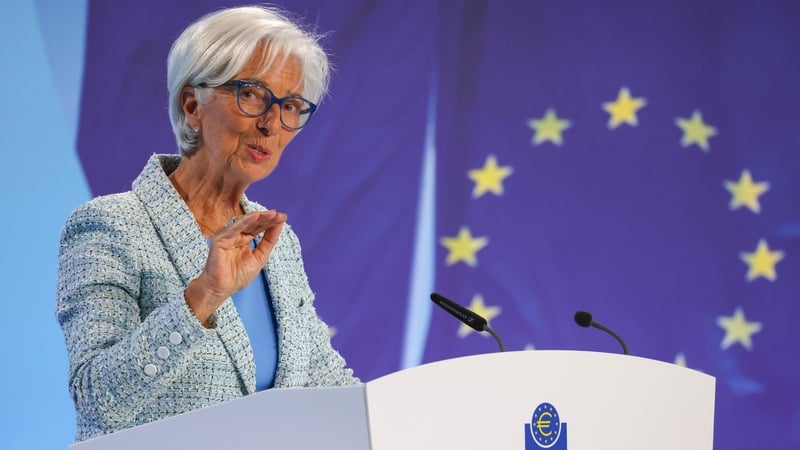The European Central Bank needs more time to conclude that inflation is firmly on a path to 2% and benign economic developments indicate that rate cuts are not urgent, ECB President Christine Lagarde has said.
The ECB lowered rates for the first time in June after its most aggressive rate hike spree on record, but held back on committing to any subsequent moves, arguing that the outlook was far too uncertain to telegraph a second cut.
"It will take time for us to gather sufficient data to be certain that the risks of above-target inflation have passed," Christine Lagarde told the ECB Forum on Central Banking, the bank's hallmark policy conference, yesterday.
"The strong labour market means that we can take time to gather new information," she added.
The ECB is trying to walk a narrow path, reconciling inflation uncertainty and weak growth. Uncertainty would warrant caution in cutting rates, but persistent economic weakness strengthens the case for easing, tugging the ECB in opposing directions.
Christine Lagarde acknowledged this dilemma, warning that it was still not a given that the bloc would avoid a recession, despite a modest growth uptick last quarter.
"A 'soft landing' is still not guaranteed," she said. "We also need to be mindful of the fact that the growth outlook remains uncertain."
Growth indicators in recent weeks have come in on the weaker side of expectations, challenging a widely held view that a year and a half of economic stagnation was over and a recovery was taking hold.
Still, investors are betting that inflation concerns will outweigh recession fears and the ECB will be very slow in cutting rates, especially since the US Federal Reserve also signalled patience.
They now price in between one and two more cuts this year and only four cuts between now and the end of 2025.
This is mostly because the inflation outlook remains far too murky. Price growth is expected to hover on either side of 2.5% for the rest of the year, before falling back to the ECB's 2% target by the end of 2025.
While disinflation has been relatively quick over the past year, high services costs threaten to derail the process and policymakers are now focusing on whether firms are starting to absorb quick wage growth or continuing to push higher wages on to customers.
"We are still facing several uncertainties regarding future inflation, especially in terms of how the nexus of profits, wages and productivity will evolve and whether the economy will be hit by new supply-side shocks," Lagarde said.

Meanwhile, the European Central Bank's next interest rate cut is still a relatively easy decision, but subsequent moves should only come once inflation is clearly heading towards the 2% target, ECB policymaker Pierre Wunsch said in an interview.
The ECB cut rates in early June but made no commitment about any further moves, arguing inflation was still too high and it lacked the confidence that 2% was within reach.
Wunsch already said at the time that the first two cuts were easy decisions and continues to maintain this view despite more recent figures showing stubborn wages and services price growth.
"If we have no major negative surprises, then based on our forecasts, I would say there is room for a second cut," Wunsch, Belgium's central bank governor told Reuters. "A small deviation from the projections would not change this view dramatically."
But even this second cut was not urgent, he said, and the ECB could wait until its next projections are due out in September.
"There is probably a premium in waiting for a meeting with new forecasts that confirm the picture but I would not make that a condition," Wunsch said.
"To continue with cuts, I would need to have some more comfort that we really are going down from 2.5% inflation to something which is closer to 2%," Wunsch said. "Do you want to go below 1% real spot rates? That's where it becomes a little bit more difficult for me."
The ECB's deposit rate stands at 3.75% and markets are betting on about 40 basis points of cuts over the rest of the year, or between one and two moves, and also see a total of four cuts in the next 18 months.
While economic growth is rebounding modestly and markets are relatively calm, a first round election victory by the far right in France complicates the picture.
Wunsch said more political turbulence is possible given several countries need painful fiscal adjustments after years of excessive spending.
"In Europe as a whole, we now have five countries in excessive deficit procedures," he said. "It's not going to be easy in any of those five countries. I was never expecting that reducing these deficits will be easy."
But he also played down any talk the ECB could activate an emergency bond purchase scheme in case political stress reverberated in financial markets.
ECB officials have said markets moves need to be unwarranted and disorderly for the ECB to step in, and events so far failed to meet those criteria.
"I think it's very important that we don't give any signal to the market that we have some kind of automaticity, limits, or hard constraints in what we do," Wunsch said. "The rule is that it must be unwarranted and disorderly. It will be a judgment call."
